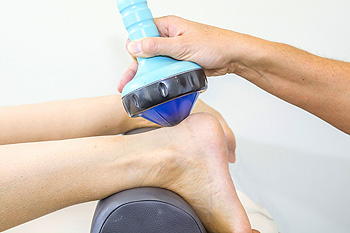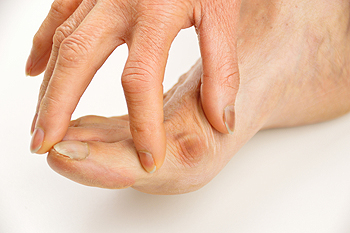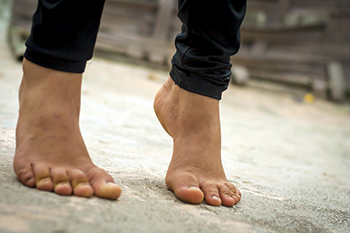Items filtered by date: August 2021
ESWT for Chronic Plantar Fasciitis
 Plantar fasciitis, an inflammation of the ligament that runs along the bottom of the foot, is a major cause of heel pain. While this condition typically responds well to conservative treatments like resting, icing, and stretching the foot, some cases do require extra care. Plantar fasciitis that has not responded well to conservative treatments may respond to extracorporeal shockwave therapy (ESWT). This is a newer, quick and non-invasive treatment that uses sound waves directed into the foot to stimulate the body’s healing processes, break up scar tissue, and reduce sensitivity and pain. If you have plantar fasciitis or chronic heel pain and would like to learn more about ESWT, please consult with a podiatrist.
Plantar fasciitis, an inflammation of the ligament that runs along the bottom of the foot, is a major cause of heel pain. While this condition typically responds well to conservative treatments like resting, icing, and stretching the foot, some cases do require extra care. Plantar fasciitis that has not responded well to conservative treatments may respond to extracorporeal shockwave therapy (ESWT). This is a newer, quick and non-invasive treatment that uses sound waves directed into the foot to stimulate the body’s healing processes, break up scar tissue, and reduce sensitivity and pain. If you have plantar fasciitis or chronic heel pain and would like to learn more about ESWT, please consult with a podiatrist.
Shockwave therapy is a treatment commonly used to treat various injuries and conditions, particularly plantar fasciitis in the feet. To learn more, consult with the foot specialists from Spartan Podiatry. Our doctors can provide the care you need to keep you pain-free and on your feet.
Shockwave Therapy
Shockwave therapy is a new treatment option designed to treat bone conditions such as tennis elbow, shoulder pain, and others. Shockwave therapy uses high intensity sound waves that are directed to the affected tissues of the body with pinpoint accuracy. The effects are very beneficial, leading to a production of collagen fibers, eliminating inflammation.
Who Benefits from Shockwave?
Shockwave is recommended for patients suffering from heel pain and associated problems. Heel pain is a common condition which can be caused by obesity, overexertion, and spending a substantial amount of time on hard floors with your feet exposed and unsupported.
Fast and Easy
The therapy is actually a simple process that can leave patients feeling better the very next day. Shockwave therapy is not as dramatic as it sounds. It enables more blood flow to effected areas, addressing the source of the problem and allowing treatment to last for a long time.
Treatment & Recovery Time
Shockwave treatment will enable your feet to recover quickly. This is especially important since surgery is not required. It is cost effective and does not require the use of anesthesia. This treatment is a better option to surgery, since it is proven safe.
If you have any questions, please feel free to contact our offices located in Battle Creek, and Marshall, MI . We offer the newest diagnostic and treatment technologies for all your foot and ankle needs.
Heel Pain Fast Facts
Heel pain is extremely common and is typically caused by small, repetitive injuries to the heel over time. Most heel pain is localized under and in front of the heel, although pain can also affect the back of the heel and can sometimes radiate to, or from, the arch of the foot or the ankle. Heel pain typically starts gradually and may worsen over time when left untreated. Potential causes of heel pain can include plantar fasciitis, heel bursitis, heel spurs, tarsal tunnel syndrome, heel pad inflammation, Sever’s disease, stress fractures, and Achilles tendonitis. Fortunately, conservative treatment methods such as resting, icing, compressing, and elevating the affected foot, as well as wearing supportive shoes and taking over-the-counter pain medications can help with pain and swelling, but may not be a permanent solution. If you are experiencing any type of heel pain, it is strongly suggested that you consult with a podiatrist to receive a proper diagnosis with a corresponding treatment plan.
Many people suffer from bouts of heel pain. For more information, contact the foot specialists of Spartan Podiatry. Our doctors can provide the care you need to keep you pain-free and on your feet.
Causes of Heel Pain
Heel pain is often associated with plantar fasciitis. The plantar fascia is a band of tissues that extends along the bottom of the foot. A rip or tear in this ligament can cause inflammation of the tissue.
Achilles tendonitis is another cause of heel pain. Inflammation of the Achilles tendon will cause pain from fractures and muscle tearing. Lack of flexibility is also another symptom.
Heel spurs are another cause of pain. When the tissues of the plantar fascia undergo a great deal of stress, it can lead to ligament separation from the heel bone, causing heel spurs.
Why Might Heel Pain Occur?
- Wearing ill-fitting shoes
- Wearing non-supportive shoes
- Weight change
- Excessive running
Treatments
Heel pain should be treated as soon as possible for immediate results. Keeping your feet in a stress-free environment will help. If you suffer from Achilles tendonitis or plantar fasciitis, applying ice will reduce the swelling. Stretching before an exercise like running will help the muscles. Using all these tips will help make heel pain a condition of the past.
If you have any questions please contact our offices located in Battle Creek, and Marshall, MI . We offer the newest diagnostic and treatment technologies for all your foot and ankle needs.
How Do Podiatrists Treat Plantar Hyperhidrosis?
Plantar hyperhidrosis is a condition that causes the feet to sweat excessively. Having wet, sweaty feet most of the time is not only annoying, but can ruin your shoes, increase your risk of slipping and falling, and break down the skin on the feet, leading to athlete’s foot and other skin infections. The first line of treatment for this condition is usually topical medications, which are applied directly to the skin’s surface. Your podiatrist may prescribe an antiperspirant cream or powder. If these fail, your doctor may suggest iontophoresis, a procedure that uses electrical currents to reduce sweating. Botox injections into the feet are another potential solution. To learn more about treatments for plantar hyperhidrosis, please consult with a podiatrist.
If you are suffering from hyperhidrosis contact the foot specialists of Spartan Podiatry. Our doctors can provide the care you need to attend to all of your foot and ankle needs.
Hyperhidrosis of the Feet
Hyperhidrosis is a rare disorder that can cause people to have excessive sweating of their feet. This can usually occur all on its own without rigorous activity involved. People who suffer from hyperhidrosis may also experience sweaty palms.
Although it is said that sweating is a healthy process meant to cool down the body temperature and to maintain a proper internal temperature, hyperhidrosis may prove to be a huge hindrance on a person’s everyday life.
Plantar hyperhidrosis is considered to be the main form of hyperhidrosis. Secondary hyperhidrosis can refer to sweating that occurs in areas other than the feet or hands and armpits. Often this may be a sign of it being related to another medical condition such as menopause, hyperthyroidism and even Parkinson’s disease.
In order to alleviate this condition, it is important to see your doctor so that they may prescribe the necessary medications so that you can begin to live a normal life again. If this is left untreated, it is said that it will persist throughout an individual’s life.
A last resort approach would be surgery, but it is best to speak with your doctor to find out what may be the best treatment for you.
If you have any questions please feel free to contact our offices located in Battle Creek, and Marshall, MI . We offer the newest diagnostic and treatment technologies for all your foot and ankle needs.
How to Tell if Your Child May Have a Foot or Ankle Issue
It might be difficult to know when your child has developed a foot or ankle issue. Because they may not be able to verbalize what’s wrong, or their symptoms may be hard to spot, you should keep an eye out for other warning signs. If your child struggles to keep up physically with their friends or their legs or feet get tired, this may be an indication of flat feet. Between the ages of 8 and 14 children may experience sever’s disease, where the Achilles tendon pulls on the growth plate at the back of the heel. This causes heel pain which may cause your child to shy away from physical activities. If your child is hiding their feet from you, they may have noticed some change and want to avoid going to the doctor. If your child seems clumsy or frequently trips or falls it may indicate a balance or neuromuscular issue, or that their feet point inward when they walk or run. Of course if they complain of any pain or discomfort in their feet, or you notice any of these warning signs, make an appointment for your child with a podiatrist for a full examination.
The health of a child’s feet is vital to their overall well-being. If you have any questions regarding foot health, contact the foot specialists of Spartan Podiatry. Our doctors can provide the care you need to keep you pain-free and on your feet.
Tips for Keeping Children's Feet Healthy
- Make sure their shoes fit properly
- Look for any signs of in-toeing or out-toeing
- Check to see if they have Clubfoot (condition that affects your child’s foot and ankle, twisting the heel and toes inward) which is one of the most common nonmajor birth defects.
- Lightly cover your baby’s feet (Tight covers may keep your baby from moving their feet freely, and could prevent normal development)
- Allow your toddler to go shoeless (Shoes can be restricting for a young child’s foot)
- Cut toenails straight across to avoid ingrown toenails
- Keep your child’s foot clean and dry
- Cover cuts and scrapes. Wash any scratches with soap and water and cover them with a bandage until they’ve healed.
If you have any questions, please feel free to contact our offices located in Battle Creek, and Marshall, MI . We offer the newest diagnostic and treatment technologies for all your foot care needs.
Let the Expert Treat Your Ingrown Toenails
Is There Relief for Bunions?
 The bottom and side of the big toe is generally the location where a bunion develops. It is considered to be a deformity and can appear for a variety of reasons. These can include genetic factors, and wearing shoes that do not have enough room for the toes to move freely in. Additionally, existing medical conditions such as gout or rheumatoid arthritis may cause a bunion to develop. If the bunion is mild relief may be found when orthotics are worn, or when the bunion is covered with a protective pad. Severe bunions may require surgery to correct them permanently. If you notice signs of a small bump on the side of the big toe, please confer with a podiatrist as quickly as possible. Early treatment can slow down or stop a bunion's progression.
The bottom and side of the big toe is generally the location where a bunion develops. It is considered to be a deformity and can appear for a variety of reasons. These can include genetic factors, and wearing shoes that do not have enough room for the toes to move freely in. Additionally, existing medical conditions such as gout or rheumatoid arthritis may cause a bunion to develop. If the bunion is mild relief may be found when orthotics are worn, or when the bunion is covered with a protective pad. Severe bunions may require surgery to correct them permanently. If you notice signs of a small bump on the side of the big toe, please confer with a podiatrist as quickly as possible. Early treatment can slow down or stop a bunion's progression.
If you are suffering from bunion pain, contact the foot specialists of Spartan Podiatry. Our doctors can provide the care you need to keep you pain-free and on your feet.
What Is a Bunion?
Bunions are painful bony bumps that usually develop on the inside of the foot at the joint of the big toe. As the deformity increases over time, it may become painful to walk and wear shoes. Women are more likely to exacerbate existing bunions since they often wear tight, narrow shoes that shift their toes together. Bunion pain can be relieved by wearing wider shoes with enough room for the toes.
Causes
- Genetics – some people inherit feet that are more prone to bunion development
- Inflammatory Conditions - rheumatoid arthritis and polio may cause bunion development
Symptoms
- Redness and inflammation
- Pain and tenderness
- Callus or corns on the bump
- Restricted motion in the big toe
In order to diagnose your bunion, your podiatrist may ask about your medical history, symptoms, and general health. Your doctor might also order an x-ray to take a closer look at your feet. Nonsurgical treatment options include orthotics, padding, icing, changes in footwear, and medication. If nonsurgical treatments don’t alleviate your bunion pain, surgery may be necessary.
If you have any questions, please feel free to contact our offices located in Battle Creek, and Marshall, MI . We offer the newest diagnostic and treatment technologies for all your foot care needs.




